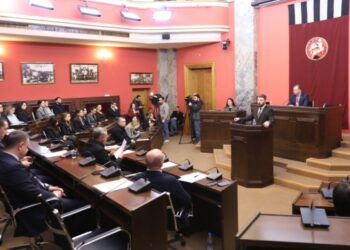There is big talk in the world’s mass media about the pros and cons of democracy. Most of us, the more or less civilized part of humankind, believe that democracy is something humanely agreeable and politically valuable, and there is nothing better out there to substitute it (at least so far!).
Many suggest that democracy, in general, does not provide for a desirable level of political stability, usually causing recurrent modifications of policies of governments. American scholars go even further. Some of them argue that the American Constitution might very well be the root of the current American defective politics, saying that the United States’ main law of the land “is in trouble, being essentially anti-democratic and, in this day and age, increasingly dysfunctional” (New York Times).
The American Liberals and Conservatives claim each is “a hazard to the Constitution,” corroborating this statement by the fact that each newly-elected president, based on the functioning law, can and does annul the rules and ordinances that were signed and adopted in their own time by the previous chief executive, especially so if the predecessor represented the other side of the legislative isle.
The selfsame scholars suggest that the USA is in serious trouble because it is egregiously difficult, and at times even impossible, to introduce an amendment to ‘We the People’. They don’t even exclude the possibility of a new constitutional convention and the prospect of secession of a bunch of states, if push comes to shove, hoping that “any divorce, if it comes, will be peaceful.”
A New York Times article by Jennifer Szalai suggests that the current American constitution could accelerate the end of American democracy: “The argument that what ails the country’s politics isn’t simply the president, or Congress, or the Supreme Court, but the founding document that presides over all three, has been gaining traction, especially among liberals. Books and opinion essays critiquing the constitution have proliferated . . . Americans have long assumed that the Constitution could save us; a growing chorus now wonders whether we need to be saved from it.” Wow! The gravity of these words triggers a number of mind-boggling thoughts.
American history textbooks have not changed in the last 150 years, if only in their more colorful and excessively sophisticated cover designs. The younger generation, hearing the above argument, are still drawing on texts that have been considered a historical truth for quite a while, stretching over tens of generations. If this kind of public dispute persists and finally leads to the revision of the quarter-of-a-millennium old American Constitution, then a myriad of things may change in the United States, including the way democracy is interpreted as “a system of government by the whole population or all the eligible members of a state, typically through elected representatives.”
Incidentally, would the famous political wisdom by the great Abraham Lincoln be revised too? I mean his yet undying aphorism “A government by the people, of the people, for the people.” No transformation of the now-archaic political rhetoric or reconsideration of current political perceptions would surprise me now. Why should the critique of the American Constitution be so shocking anyway? It has served its time, and might now be altered as contemporary life demands and dictates.
Szalai continues: “In 1787, when 55 delegates convened in Philadelphia to revise the Articles of Confederation, they ended up embarking on a project that was much bigger in scope.” And newer too, I would say! Well, if the revision was possible then, at the end of the 18th century, why should it be impossible nowadays when the reasons for change are more acute and straightforward? The American system of government, reflected in thorough details of the constitutional text, is as strong today as it has ever been, and yet, it is Man-made and by Man will it be changed as long as life suggests the change, but not to the detriment of the American people, only to their benefit!
Op-Ed by Nugzar B. Ruhadze














